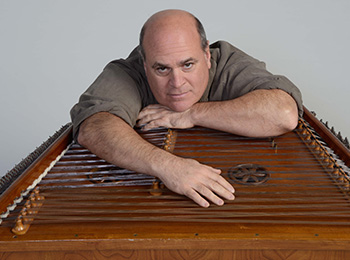TORONTO — Part burlesque, part chamber folk opera, Lilith: The Night Demon in one Lewd Act, written and composed by Joshua Horowitz, veers from smutty to serious in its portrayal of Adam’s first wife.
Having premiered in June in the San Francisco Bay Area, Lilith has its official Canadian debut on Sept. 1 at Harbourfront Centre Theatre, as part of Toronto’s Ashkenaz Festival, before touring on the U.S. east coast and in Europe.
Horowitz’s klezmer trio, Veretski Pass, will provide instrumentals for the play, and the choir will be conducted by Alexander Veprinskiy.
Lilith is premised on the midrash that Adam had a different wife prior to Eve. This was to explain the disparity between the first chapter of Genesis, which says God created man and woman, and the second chapter, which says Adam needed a mate.
The story of Lilith, was expanded upon in the medieval text The Alphabet Ben Sira, and tells that God created Lilith as a companion for Adam but she turned into a winged demon and flew away when Adam took issue with the fact she refused to lie beneath him during intercourse.
The story goes that Lilith subsequently took to visiting men at night and using their nocturnal emissions to conceive demon babies.

Further, she would lurk near the birthing beds of women to snatch up and strangle their infants.
After Adam asked God to return Lilith, he appointed three angels to bring her back.
She refused, but made a deal with the angels that if any woman wore an amulet inscribed with Lilith’s name, her baby would go unharmed.
“It’s a silly story to you and me,” Horowitz said, “but if you look at it from a 10th century mentality, child mortality was so rampant. It’s the ultimate theological evil that babies would be taken at all…so the idea that a woman herself would kill them seems to emphasize how senseless infant mortality is.”
Horowitz, 54, previously wrote a children’s opera performed in Austria, and wanted to create something that focused on superstitious beliefs within Judaism.
He found that the fear that one’s babies would be taken by demons was a pervasive one.
“Then I discovered this story of Lilith and thought, ‘this has not really been told before…and certainly not as an opera.’”
The play, which he describes as “tragicomic,” features the characters of Adam and Lilith, the three angels, and a narrator.
“In a sense, I was well-suited to the task of performing an edgy Yiddish folk opera, that most curious of beasts,” Anthony Russell, the actor who plays Adam, says.
An opera singer for 15 years, Russell is a recent devotee to Yiddish music. He said he’s drawn to the role of Adam because of the character’s intrinsic limitations.
“In the broadest sense, Adam is kind of the starter boyfriend of the entire human existence,” he said.
“Everything he knows about human interaction is happening for the first time. As the words of the midrash go, he really is this unformed lump of clay, but with a libido.”
Horowitz said he used a lot of humour and “urban sex slang” to weave into the dialogue some of what he called the “perverse sexuality that happens in the Torah.”
For example, “the idea that nocturnal emissions create demons is a belief that’s thousands of years old. At one point, the narrator says, ‘Chorus, let’s sing the nocturnal emissions fugue.’ And then that’s a song in the play.”
Though it starts as a bawdy burlesque comedy, Lilith enters more serious territory in its second half, tackling the emotional intensity accompanying infant death.
“The play has no moral per se, but there’s the realization that we’re living a really dangerous and flawed existence,” Horowitz said.
His intention was for the lewdness and humour to serve as an access point for deeper feeling.
“If you start with [sadness], you never get to the emotions of the audience. But, if you start with humour and some shock, then people open up,” he explained.
“Once you get people laughing, they’re open to any kind of serious emotions you want them to feel.”
Lilith is one of several theatrical offerings at Ashkenaz . Others include The Big Bupkis: A Complete Gentile’s Guide to Yiddish Vaudeville, Yosl Rackover Speaks to God and Something From Nothing.
Ashkenaz runs Aug.26 to Sept. 1. Visit www.ashkenazfestival.com
